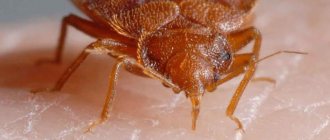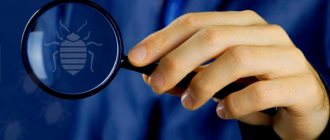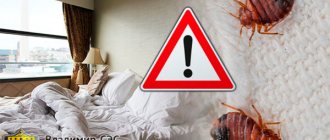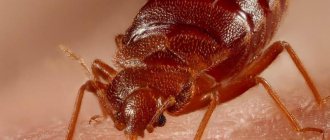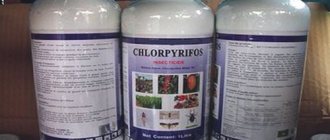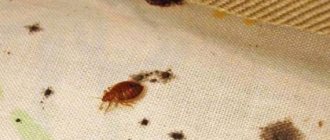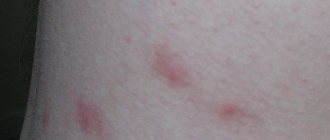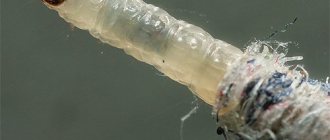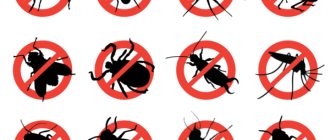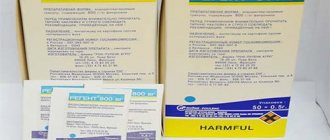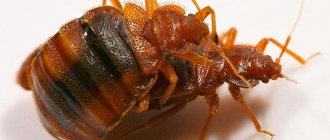What will help against bedbugs?
The appearance of bed parasites does not depend on the cleanliness of the home or lifestyle. Modern bedbugs adapt to any conditions and will find suitable shelter everywhere. This is why information about these pet parasites is essential for everyone.
Bedbug larvae can be brought into the house on animal fur, with cardboard packaging from the store, or on clothing. There are many ways for parasites to enter an apartment. To get rid of them you need to use the weak points of insects.
Pin
Effect of light
It is no coincidence that bedbugs are nocturnal parasites. They do not tolerate ultraviolet rays and high temperatures (more than 50°C).
When bright light appears, bedbugs run away. They place their nests in dark places where light never penetrates. There they spend the bulk of their lives, going out only to hunt once every 5-7 days.
A bright beam of light can put bed parasites into a state of panic - they begin to scatter. In this way, they check for the presence of bedbugs in the apartment - they suddenly turn on the lights at about 3 - 4 o'clock in the morning. It is at this time that bedbugs come out to feed on blood.
Pin
Very hungry insects may go hunting during the daytime.
Where do bedbugs come from in an apartment? How do bedbugs appear at home?
Bedbugs appear in an apartment in the following way: 1) They crawl from neighbors. This means that your neighbors have had parasites for quite some time, and the bugs are migrating in search of food and new nesting places. They usually penetrate through ventilation, adjacent sockets, switches, cracks in walls and other leaks. 2) Brought in by guests who already have bedbugs. Bed bugs often crawl into bags, umbrellas and clothing, so it's easy to move them to another room without even realizing it. 3) You brought them from the street. It is possible to carry bedbug eggs from the street on clothes, for example on a bus or subway, where people often come into contact with each other's clothes and things. 4) After renovation of the house by guest workers. Repairing a turnkey apartment or entrance can result in a bedbug infestation throughout the entire house. 5) They crawl out of neighboring houses in warm weather. Bed bugs can migrate under their own power between homes and along exterior walls. Also on pets, cats and dogs, who often walk in hallways and basements and insects crawl on them.
Bedbugs appear regardless of whether the apartment is dirty or perfectly clean. They only care about the people who sleep in this room.
Temperature changes
Pin
A comfortable environment for home bugs to live is a temperature range from +20 to +30 degrees.
Temperature changes will affect the rate of development and reproduction of these parasites. With a significant decrease, for example, to -40, the insects die.
This is the basis of the freezing method, when furniture with bed bug nests is taken out into the cold and left for a long time.
This method of control is suitable in areas where low temperatures last for a long time. If the frost is not severe, the parasites will go into a state of suspended animation. When the temperature rises, insects become more active and restore their vital functions.
High temperature has a stronger effect on bed parasites. Exceeding + 50 o C is destructive for them. This is used to get rid of domestic insects with the help of steam.
A steam generator is used to treat nests and suspected habitats of bedbugs. Items must be washed at high temperature (not lower than + 50 o C).
Turn bed linen inside out and iron it on both sides with a hot steaming iron. Particular attention should be paid to the seams. This way you will be able to get rid of the clutches of eggs that are usually found in the seams.
What are bed bugs afraid of?
Temperature too low or high
The optimal temperature for life, reproduction and feeding of domestic bugs is considered to be between +20 and +30 degrees Celsius. But temperatures of 10-20 and 30-35 degrees Celsius are already quite uncomfortable for them, although still tolerable.
Of course, they are unlikely to leave places where exactly this temperature regime is maintained, but bedbugs will not want to reproduce in this situation, and perhaps the process of their reproduction will slow down significantly.
When the temperature in the room is constantly kept either below +10 or above +35 degrees, insects leave the home.
However, if the temperature changes periodically throughout the day, the parasites will probably get used to it.
In general, in order to force insects to leave the house, you should warm up the apartment to somewhere around 38 degrees Celsius for at least a couple of days, or cool it below +10. Naturally, it is undesirable to be in the room yourself at this time.
Are house bugs afraid of light?
We are talking not only about artificial, but also about natural daylight. Bedbugs are nocturnal insects; their peak activity occurs between three o'clock in the morning and 7 o'clock in the morning. As soon as you turn on the light at night or lift the mattress during the day, they immediately scatter in all directions.
But in practice it is very difficult to use this fear of theirs, because if the insects find a secluded dark place (for example, behind the baseboards), then the light will no longer scare them.
Plant scent: tansy and wormwood
What grass are bedbugs afraid of? The most famous herb against these insects is wormwood. Small brooms of dry wormwood are often laid out in the house under sofas, beds, and other furniture. A positive result lasts for three days, but as soon as the bugs get very hungry (on the fourth day), they will be able to attack, even if you lay out branches of fresh grass.
Exactly the same situation is with tansy.
The wisest thing to do is not to try to repel pests with herbs, but to use them to create barriers (even aromatic ones) for their penetration into the house. To do this, you just need to lay out dry branches in the ventilation and near the windows on the balcony. Parasites from neighbors who accidentally drop by, when faced with an aromatic barrier, will turn around and crawl back.
The use of birch branches is also common in villages. True, there is no evidence that birch really has a serious effect.
Perfumery
Even in the distant Middle Ages, people knew about the hostility of bed bugs to perfume scents. Noble court ladies and nobles often took baths with aromatic oils. And after the procedure, colognes and perfumes were generously applied to the body to protect themselves from bedbug bites.
Yes, insects really do not like the strong smell of perfume, and the stronger the smell, the more unpleasant it is for parasites.
And yet, the feeling of intense hunger turns out to be stronger, so after two or three days they will definitely attack, even if a person perfumes himself with the most disgusting cologne literally from head to toe.
What smell are bed bugs afraid of?
Among the truly reliable means of repelling bedbugs and other insects are kerosene, acetone, vinegar, etc.
For example, bedbugs cannot tolerate the smell of ammonia, and the more distinct this smell is, the more uncomfortable it is for them to be in the room.
Therefore, if you are afraid of bed bugs and want to take preventative measures, simply wash the floors in your apartment with water to which you first add ammonia. And your own sense of smell will help you make sure that you did everything correctly, that is, if after washing the floors you yourself smell the ammonia, then the bedbugs will certainly smell it.
Odors intolerable to insects also include turpentine and denatured alcohol. Don’t forget, none of the listed remedies will kill a bedbug, but they are good at repelling bloodsuckers if they are used in the same way as ammonia.
You can dip the bug in regular table vinegar (9%) and make sure nothing happens to it. However, parasites cannot stand the smell of any vinegar.
It is worth placing a container with at least a drop of vinegar in the center of the place where the insects constantly live, and after a couple of weeks they will leave the nest and will not appear there again.
A significant disadvantage of each of the listed remedies is their intolerance to humans.
You may feel almost nothing with a small amount of ammonia or acetone. But using a little more will make it difficult for you to stay indoors, especially for a long period of time.
The solution will be to treat the room, wash the floors, provided that you then leave your apartment for at least a day as quickly as possible.
Are bedbugs afraid of water?
Pin
Bedbugs are indifferent to water. They do not know how to swim, and if they get into a large amount of water, the insects will drown. Getting their places of residence wet and strong humidity does not harm them. They will not settle in such a place. Bed bloodsuckers prefer to organize their nests in dry, warm, dark places.
Using water will not get rid of bedbugs. Wet cleaning can reduce the number of eggs, but this is an ineffective method of control. Adding salt or soda to water will not give a positive result.
Insecticides
Store-bought insect repellents can be toxic. After using some of them, it is recommended not to appear in the treated apartment for a day.
Sprays
You can get rid of bedbugs using “Raptor”, “Dichlorvos”, “Combat”, “Carbozol”, “Antiklop”, “Prima-U”. The product is sprayed onto all surfaces where parasites may appear. When working with sprays, you must use a respirator.
Gels
“Fas”, “Fumitox”, “Brownie”, “Absolute” help well. The gel is spread in places where bedbugs may appear: along baseboards, near the bed, cabinets and drawers, near ventilation.
If there are small children or pets at home, it is better to move them to another place for 1-2 days to avoid poisoning.
Powders or crayons
“Mashenka” and “Clean House” crayons are effective. From powdered forms, you should choose “Riapan”, “Phenaxin”, “Lethal force” or “Fas-Double”.
Bed bug chalks are a reliable and effective remedy for domestic parasites.
Other insects
Pin
In addition to bedbugs, other insects may live in the apartment. Not all of them are able to live together. Some may eat other parasites. Bedbugs get along with cockroaches. They have different food and habitat. Only in some cases do cockroaches eat bedbug eggs.
The enemies of house bugs are:
- ants;
- centipedes;
- spiders;
- mites;
- other types of predatory bugs.
Effect of ultrasound
Pin
To get rid of night parasites, advertising suggests using an ultrasonic bedbug repeller.
The operating principle of the device is based on the fact that insects cannot tolerate sound waves of a certain range and leave the area. Science knows that animals and insects sense vibrations in the soil, for example, before an earthquake, and leave the area.
For bedbugs to also respond to an ultrasonic repeller, they must have a hearing organ, but they do not have one.
In space, bed parasites navigate by smell and react to heat. Thus, they find food for themselves - humans. They don't need a hearing organ. They cannot perceive ultrasound vibrations. The effect of the repeller on the insect's nervous system has not been proven.
The advertised device has low power. He will not be able to create vibration in hard-to-reach places. The sound wave must pass through the walls of the apartment, the thickness of the carpets, and furniture. To do this, it must be powerful enough, which is impossible when connected to a 220 volt network.
The ultrasonic repeller does not affect insects. But even if it were effective, it would drive out the adults. Untouched eggs can quickly restore their numbers.
The influence of strong odors
Pin
Night bloodsuckers do not like strong odors. They especially don't like the smell of tansy and wormwood. These plants are used to prevent insect infestation of premises. Fresh or dry plant branches collected during the flowering period are laid out in the habitats of parasites:
- under the mattress;
- next to the head of the bed;
- on shelves in the closet;
- on the windowsills.
Dried crushed herbs are sewn into gauze bags and placed in the pockets of clothes, which are hung in the closet for storage and laid out between books. It is effective to take a small fragrant bag with you in your travel bag or suitcase. This way there is less chance of bringing bedbugs back from your trip.
Perfumes
People have known that bed bugs do not like the smell of perfume since the Middle Ages. Every evening, aromatic baths were prepared for noble ladies and nobles after the reception, in which perfumes and colognes were used. In this way, the nobility protected their body from the bites of bloodsuckers.
Ways to repel parasites
This may seem strange to some, but perfumes are something that can repel bedbugs very easily. It is also surprising what smell bedbugs are afraid of: the stronger the aroma, the more pests are afraid of it.
On a note!
For preventative purposes, it is enough to spray the sleeping area, and even the body itself, in several places, even with the most inexpensive cologne or eau de toilette, in order to discourage parasites from approaching the bed. However, this method has a short-term effect and can be used as a temporary measure before disinfesting an apartment for bedbugs.
Are bedbugs afraid of perfumes?
Pin
Domestic parasites dislike strong odors, including those from perfumes. We must remember that it will not kill bedbugs, but will only scare them away.
This will come in handy to get a good night's sleep if insects are found indoors. For example, you saw that you were bitten by bedbugs, but you need to wait until morning to buy a remedy against parasites.
It is necessary to apply strong-smelling cosmetics to the body - bedbugs are guaranteed not to approach such a food source.
Parasites especially do not like the smell of aromatic oils - eucalyptus, lavender, orange, peppermint.
To expel bedbugs and prevent their reappearance, wet cleaning is carried out with the addition of these oils to the water. She washes floors and wipes furniture.
We must remember that perfumes and aromatic essential oils have no effect on eggs. They can only be used in combination with other means, then positive results can be obtained.
Will bedbugs survive in an empty apartment?
Bed bugs (in Latin: Cimex lectularius L.), which are also called house bugs, may not die for a very long time, even if a special substance was used to get rid of pests. The body of nymphs and adult bedbugs is able to withstand a decrease in temperature, a decrease in the amount of food, and other negative factors.
At the same time, couch bugs quickly become active as soon as the victim appears nearby. In this regard, the question arises of how long bedbug larvae live, and also how long it takes for bedbugs to die without blood.
When leaving an empty apartment to destroy bedbugs, you need to take into account that their life processes slow down greatly at any stage of development. Even larval nymphs do not require food or water for a long time.
Adults of various species choose secluded places inside furniture, including on the outside and inside of the bed. Parasites can hide in cracks and cracks in the morning and return to the bed at night to drink blood.
Despite the fact that their viability depends on environmental conditions, the body performs all functions for a long time even in the absence of food, thanks to which bedbugs survive. Bedbugs can stay in an apartment for a long time if it remains warm enough.
Without food and water, bedbugs can remain alive for up to several weeks, even in an empty apartment. If the house is an apartment building, then, experiencing hunger, the bedbugs move to other rooms, where there are people.
Where do you live?
In a comfortable apartment
50%
In a private house
50%
We invite you to watch the video below about available methods of treating premises with insecticides and improvised means against bedbugs.
The effect of kerosene on bedbugs
Pin
Kerosene has a pungent odor, so it can repel parasites. It is used to treat baseboards, bed legs, cabinets, and other furniture. Lubricate doors and areas under windows. Often, to enhance the effect, kerosene is used in mixtures with other substances - turpentine, naphthalene, laundry soap.
Kerosene is a cheap product, but it has many big disadvantages:
- strong, persistent odor that is harmful to humans. It is absorbed into fabrics, wood, and other materials. Remains in the room for a long time, ventilation does not allow it to get rid of;
- leaves greasy stains on fabrics;
- It is difficult to wash off kerosene from surfaces. It is flammable, that is, the entire apartment becomes flammable;
- low efficiency. Repels rather than kills bed bugs;
- does not affect parasite eggs, so re-treatment is required after 2 weeks.
Using kerosene is an old method. It was used at a time when more convenient drugs had not been invented.
What smells do bedbugs dislike?
Incredible as it may seem, bed bugs will not like being in a room that smells of perfume .
The stronger the smell, the quieter the insects will behave, trying to hide in deep crevices. Of course, this is temporary - hunger will definitely conquer all fears and send you on a search for warm blood.
Vinegar is another effective remedy; bloodsuckers are afraid of the smell of the kitchen product. You should not expect that the parasites will leave the room for good, because even to repel them you will have to repeat the boring ritual of applying liquid to all surfaces every day. (You can read - Vinegar for bedbugs)
Many people recommend this remedy for bedbugs. Read >>>!
Vinegar or perfumes with a strong, persistent odor can be used not only to slightly calm the bedbugs that have occupied the room, but also to use the properties of the products to protect a clean apartment from the invasion of unwanted residents.
It is enough to periodically apply the liquid to all possible places where insects can enter (ventilation grilles, cracks in the walls). A strong smell will not allow parasites to smell such an alluring smell of human blood.
Tobacco . It has a pungent and unpleasant aroma for bedbugs. All other things being equal, they would rather go to visit places where there is no smell that irritates them.
Bleaching
Pin
Bleach does not have insecticidal properties, but bedbugs may be frightened by its strong smell. This will not affect parasite eggs, so the effect will be minimal. Bleach is harmful to humans and is not recommended for use in residential areas.
Bed bugs themselves will not crawl into bleach; it will not be possible to treat nests with chlorine solution. It is better not to use bleach as an insecticide. There are more effective anti-parasite products on the market that are less toxic to humans.
Strong aromas
If bedbugs are not constantly repelled, they will infest the apartment and the fight against them will become more difficult in the future. When parasitic colonies are detected, it is important to establish possible ways of their penetration into the living space in order to prevent new colonization in the future.
Domestic bugs are very frightened of certain odors, which are detected by developed olfactory receptors. For natural repellents, use fresh herbs.
Sagebrush
An effective and inexpensive remedy that drives away insects for a long time. The plant is collected independently or purchased at the pharmacy. It is more effective to take fresh, but even in dried form the effect is not much weaker.
Bunches of wormwood are laid out in different places in the apartment where the presence of bedbugs is possible: under carpets and rugs, in sofas, armchairs and furniture. It won't destroy them, but it will definitely scare them away. The downside is that the strong aroma of wormwood has no effect on parasite eggs.
The harmful effects last for 3-4 days, then the grass is replaced with fresh one. During this period, people living in the apartment will be able to rest or treat with insecticidal preparations.
Placing plants near sockets, ventilation shafts, and thresholds helps prevent the migration of neighboring bloodsuckers. Then the parasites pass by. Before spreading the herbs, carry out general cleaning.
Tansy
Bedbugs are afraid of this fragrant grass with yellow flowers just like wormwood. Used fresh, dried, or prepared as a decoction.
Bunches are placed under mattresses, bedroom furniture and other places where insects accumulate. For the decoction you will need 200g of herbal raw materials per liter of water. Boil, cool and filter. The resulting composition is sprayed throughout the living space. The clutches cannot be destroyed this way, but the insects escape.
Air
To combat parasites, it is recommended to purchase ready-made calamus grass at the pharmacy. Available in powder form, which is scattered in places where bedbugs are located. The grass is not harmful to humans and pets. Decoctions and infusions are no less productive in terms of killing parasites.
Chamomile
Bedbugs do not tolerate the chamomile scent. Dalmatian chamomile, which is richer in essential oils, is suitable. An alternative would be a pharmacy, weaker in terms of impact, but not by much.
An analogue of pharmaceutical chamomile will be a drug called Pyrethrum. Grass is included in its composition. The product has a calming effect on people and a repellent effect on bedbugs.
Bay leaf
Another option for expelling blood-sucking insects from the house. Every housewife has a bay leaf, as it is used in cooking to add a piquant aroma to dishes. But bedbugs cannot stand this smell and retreat back home.
Sheets are laid out around the room in unlimited quantities. They make infusions that are used to treat all surfaces in the house. This will protect you from bed bug infestations for several days.
Myths about bedbugs - what they are not afraid of
Some advertised methods of combating domestic parasites turn out to be completely useless.
For example, magnetic resonance radiation does not pose a threat to them. For this method to really work, you need to turn on such power that a person cannot stand it. Ultrasonic repellers are useless in the fight against bedbugs.
Wet cleaning with the addition of soda and salt does not help. These components will not affect night parasites in any way, especially in diluted form. Salt and soda do not have any pungent odors, and they will not be able to corrode the chitinous shell either.
Do smells repel bedbugs?
Couch bloodsuckers have a developed sense of smell. They smell a person at a distance of up to 3 meters, and carbon dioxide released during breathing - at a distance of up to 30 m. Therefore, it is believed that treating the home with strong-smelling compounds helps repel bedbugs. Is it so?
Vinegar
Vinegar has a pungent odor. Therefore, it can act as a repellent, but not longer than 6 hours. It should be borne in mind that acetic acid is often diluted with water before use to obtain a solution with a weak concentration. In this form, it will not be able to spoil the furniture and decoration. But then the smell will disappear in half an hour.
To get the desired effect, you will have to treat the apartment with vinegar essence. But concentrated acid not only damages property, its fumes cause burns to the mucous membranes of the eyes and respiratory tract. Therefore, using vinegar against bedbugs is either useless or dangerous.
Tar
It is a resinous product that is obtained by dry distillation of wood. It contains resins, phenol, toluene, cresol, benzene, toluene and other substances. They have a strong odor that penetrates into materials. It is impossible to remove it later, but it can take months to disappear on its own.
Despite the strong smell, tar does not work any better than vinegar. During the first days, parasites can remain in shelters. But when hunger becomes stronger than fear, they will still crawl out and get your blood. But your apartment will smell for a long time.
Bleaching
Bleach is used to bleach fabrics and disinfect premises. It smells strongly and causes a burn upon contact with the outer shells. That's why bedbugs are afraid of her. To remove them from the apartment, you need to wash the floors and other surfaces with water and bleach. To prevent burns, you should work with gloves.
You can also use bleach to control bedbugs. It needs to be scattered in all corners, crevices, and secluded places. It will disrupt the integrity of the bug's shell and lead to the death of the parasite. The price of such a victory is the unbearable smell of chlorine, which can cause poisoning and pulmonary edema.
Attention! Bed bugs are afraid of bleach. But it cannot be used in large quantities at home, because it is no less toxic to humans than to insects.
Flammable substances
If bed bugs appear in a house, people advise treating it with gasoline, diesel fuel or kerosene. The point here is not so much the smell, but the resinous consistency of the liquid fuel. It clogs the sensilla - the respiratory organs on the surface of the bug's body, through which oxygen enters (insects do not have a nose). As a result, the parasites suffocate.
To get rid of bedbugs using gasoline, kerosene or diesel fuel, you need to thoroughly treat all surfaces and crevices in which bloodsuckers can hide. Then they will inevitably touch the fuel while leaving the shelters. The problem is that flammable vapors are highly toxic to humans. Another danger lies in creating a fire hazard - the house can burst into flames from the slightest spark.
Essential oils
It is believed that the use of essential oil is effective against bedbugs. Presumably they are afraid of essential oil:
- nettle;
- rosemary;
- chamomile;
- carnations;
- lavender;
- peppermint;
- tea tree.
Using essential oils in their pure form is dangerous for humans and is ineffective in the fight against bedbugs. In order for them to smell the smell, you need to force the ether to actively evaporate. This can be done by diluting a few drops of oil in vodka. The alcohol contained in it is highly volatile and promotes better evaporation of substances dissolved in it.
You can make your own repellent using essential oils. This is the name of the odorous product that bed bugs are afraid of. To prepare it you will need:
- 60 ml water;
- 30 ml vodka;
- 10 drops of peppermint and lemon (grapefruit) essential oil;
- 8 drops of lavender essential oil;
- 5 drops of geranium oil;
- 3 drops of rosemary, cypress and vanilla oils (can be replaced with patchouli and myrtle oils).
All components must be mixed until smooth and placed in a spray bottle. Homemade repellent should be used daily on living rooms and furniture. The advantages of this product are safety for humans and a pleasant aroma at home. The disadvantages include the low efficiency of the method. Over time, bedbugs will get used to the smell, and it will no longer repel pests.
Attention! Many essential oils are contained in the peel of citrus fruits. You can place them under the sofa, behind the bed, near cracks and other hiding places.
Plants with a pungent odor
Scented plants act like essential oils. Bed bugs do not like the pungent smell of plants such as:
- tansy;
- sagebrush;
- marigold;
- chamomile;
- calamus (root);
- mustard (seeds).
There are several ways to use herbs in the fight against bedbugs. You can lay out sprigs of tansy or wormwood on the floor, put them in a closet with linen, or tuck them into the folds of upholstered furniture. But when they dry, the aroma from them will decrease. It is difficult to pull out branches intact from secluded places - they become fragile, causing them to break and leave behind debris.
Another way to use herbs against house bugs is to prepare decoctions. For 1 liter of water you will need 20–30 g of dry grass, inflorescences, roots or seeds. They are placed in a pan and filled with water, placed on the stove. The herb and inflorescences should be boiled over low heat for 5 minutes, seeds - 10 minutes, roots - at least 20 minutes. Then the broth is cooled, filtered and used as a repellent.
Preparing a repellent based on herbal decoction takes a lot of time. But the method is not highly effective. Another disadvantage is that herbal infusions leave stains that are difficult to wash off on fabrics.
Seasonings
It is popularly believed that bedbugs do not like the smell of bay leaves, vanillin, rosemary and cloves. We have already concluded above that “aromatherapy” in the fight against bedbugs is ineffective, and it gives only temporary results. Therefore, seasonings should be used only in combination with other, more effective methods. They can be placed around the house in whole branches or sprayed with the prepared decoction.
Solvents
Acetone and turpentine also have a strong odor. However, bed bugs are afraid not of the smell of solvents, but of contact with them. They corrode the shells of insects, which leads to their rapid death. Despite the ability to exterminate parasites, the use of acetone and turpentine at home is undesirable because:
- solvents are toxic to humans;
- they dissolve paintwork;
- spoil fabrics and other materials;
- They leave behind a persistent unpleasant odor that does not disappear for a long time.
Tar or laundry soap
You can try to repel bedbugs with a soapy smell. Laundry or tar soap are more suitable for this purpose. They leave lingering odors even after drying. For humans they are harmless and quite tolerable. Another advantage of the method is that the soap film that envelops the bug interferes with its breathing. This can lead to the death of insects. But in order to treat parasites with a soap solution, you will first have to find their nesting sites.
Medicines
Among the medicines used in the fight against bedbugs, ammonia and Vietnamese balm “Zvezdochka” are used. Ammonia quickly dissipates, but the balm not only has a persistent odor, but also irritates the body of the bug upon contact. After all, it represents a high concentration of essential oils. But for processing at home you will need as much balm as you will not find in any pharmacy.
A solution of boric acid is also sometimes used in fighting. It doesn't actually harm bedbugs. They are not afraid even of its smell. The product is mistakenly used against bed bugs because it is effective against cockroaches. But the latter die from ingesting acid, while bedbugs feed only on blood.
What do bedbugs like?
Pin
Nocturnal parasites love cozy, warm places where there is little light. They are attracted to human blood and carbon dioxide. It is by this gas that they find a person.
It turns out that bedbugs love to travel. They are able to follow a person in his clothes or things.
Having drunk blood once every 7 days, the parasite will try to lie down in things, because the temperature of the human body is too high for it. But then the parasite will find its owner again.
According to the latest scientific data, bedbugs love synthetic fabric. They prefer synthetic upholstery of furniture, clothing, and things.
Insect experts also say that bedbugs love bean leaves. Special traps are even being developed that imitate the villi of the leaves of this plant to attract parasites. Once bedbugs get into the traps, they will be burned along with the pests.
What you need to know about the diet of bedbugs
To get rid of pests once and for all, you need to find out what bed bugs eat and how many years they live without food. Bed bugs feed on human blood, and for this reason, bloodsuckers settle in those places where a person spends the most time - for example, in the bed.
The life of bedbugs depends on the sleep phase of a person. Apartment bugs eat when a person is in deep sleep - from 3 am to 8 am.
The process of feeding with blood is very important for the insect and has a direct impact on growth, development and reproduction. A number of processes in the body of a female parasite are impossible without a person.
The most significant factor is temperature; bedbugs can reproduce regularly if they have access to a warm, humid environment. Insects are able to drink blood when a person is calm and motionless, that is, in the stage of “long” sleep.
The pest easily climbs onto the body and bites through the skin. While feeding, the insect injects an anesthetic substance under the human skin and calmly drinks blood for 10 minutes. Women and children are known to be particularly susceptible to bites due to their thin skin.
Wikipedia characterizes bedbugs as extremely tenacious pests. A bug that has drunk blood goes into a state known as bedbug suspended animation.
Signs of a parasite bite:
- Itching and scratching;
- Swelling of the skin;
- A path of red spots on the skin due to the fact that insects move along the skin, making several bites;
- Soreness.
Reactions to stings may vary from person to person. Some people don’t even notice the marks, but people with sensitive skin can suffer greatly not only from visual discomfort, but also from severe hyperemia.
When a bug bites, a red dot is often visible on the skin around the bite - this is dried blood.
Having noticed red spots on the skin, you need to carry out treatment in the apartment in the following sequence:
- Find a nest of bedbugs, inspect all upholstered furniture and cracks in the floor and walls. To make it easier to understand where bedbugs have settled, you need to look for their traces - most often these are small black dots;
- Select the treatment method - chemical;
- Carry out a complete treatment of the room.
The main factor in which the insecticide will work is a complete change of bed linen and the absence of a person in the room.
How to trap?
Another method of getting rid of domestic parasites is traps. You need to lure insects into them, knowing their preferences.
For example, bedbugs like to make their nests in tight, dark places. Corrugated cardboard is great for this. If there is one in the apartment, then nocturnal parasites will definitely make their shelter out of it.
You need to specially bring such cardboard, leave it next to your sleeping place as a trap, throw it away after 2 - 3 days, or better yet, burn it.
Bed bugs find a sleeping person by the carbon dioxide they exhale. There are special traps that are based on this weakness of the parasites. They are very effective.
The device consists of a kind of vessel with liquid. It evaporates and reaches the surface in the form of a dome. The gas attracts parasites, but does not kill them. They get stuck in a trap. In the morning they are flushed down the toilet.
To increase effectiveness, you can add a piece of napkin soaked in human sweat to the device. The device is expensive because it is manufactured abroad. This is the only “minus” of the device.
Traps are currently being created that will imitate the odors produced by bed bugs when navigating in space. This will help attract parasites to the traps.
Using traps to control nocturnal parasites is not the most effective way. It does not work against eggs, which means you will need to use the devices for a long time. Making traps specifically for bed bugs is difficult.
To attract other domestic parasites, it is easy to choose bait. It will be bread, sweet water or cheese. Bedbugs will only be interested in human blood; they are not very willing to accept all other baits.
